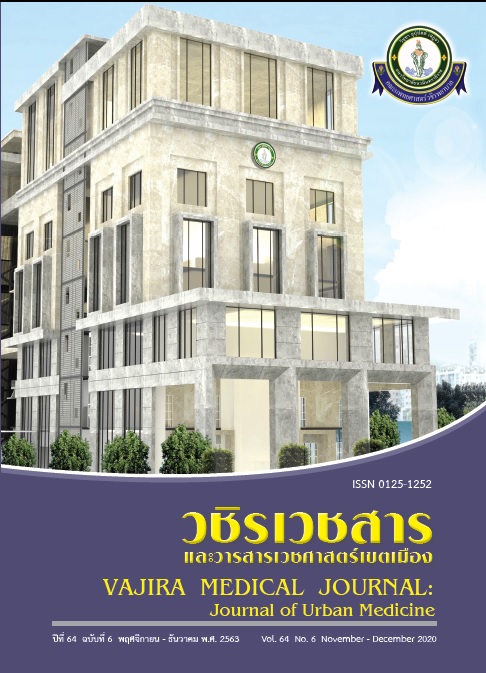Development of Nurses Competency for Monitoring Sepsis among Patients in Surgical Intensive Care Unit
Main Article Content
Abstract
Sepsis is one of the major cause of mortality for critically ill patients. Therefore, nursing competencies are imperative to keep patients’ safety and decrease loss of organs, including to further survival.
Objective: To compare nursing competencies before and after based on nursing practice guideline for sepsis patients.
Methods: This study was a one group quasi-experimental research on 20 registered nurses who worked at surgical intensive care unit in November 1, 2018 to January 31, 2019. The guideline was conducted through research utilization consisted of three steps. Initially, to determine an appropriate nursing practice guideline and patient sepsis assessment by using qSOFA and SOFA score. Secondly, to implement three period of interventions resulting to an organs failure assessment based various scenarios. Lastly, to evaluate the scores difference before and after development of nursing practice guideline. Data were analyzed by frequencies, percentages, means, and standard deviations. Comparative analysis of means scores using Repeated Measure ANOVA was also applied to the study.
Results: The average age of 20 registered nurses were 28.1 years. Most of them were females and single with average 6.0 years of work experience. The score after using nursing practice guideline for critical sepsis patients revealed significantly higher scores as compared before the guideline were developed at p-value less than 0.001.
Conclusion: Nursing practice guideline and patient sepsis assessment could influence the increment of competencies among registered nurses in simulation situation. However, these guidelines should be used in practical work, evaluated and monitored continuously including application to another intensive care unit. Consequently, the guideline for critical sepsis will stay in similar direction.
Downloads
Article Details
References
Singer M, Deutschman CS, Seymour C, Shankar-Hari M, Annane D, Bauer M, et al. The third international consensus definitions for sepsis and septic shock (Sepsis-3). JAMA 2016;315(8):801-10.
Healthcare Cost and Utilization Project (HCUP). Agency for healthcare research and quality rockville: MD. 2013 [cited 2018 May 22]. Available from: www.hcup-us.ahrq.gov/nisoverview.jsp.
Blanco J, Muriel-Bombín A, Sagredo V, Taboada F, Gandia F, Tamayo L, et al. Incidence, organ dysfunction and mortality in severe sepsis: a spanish multicentre study. Crit Care 2008;12:R158.
Strategy and Planning Division. Public Health Statistics A.D.2015: Ministry of Public Health; 2015 [cited 2018 May 22]. Available from: https://bps.moph.go.th/new_bps
Strategy and Planning Division. Public Health Statistics A.D.2016: Ministry of Public Health; 2016 [cited 2018 May 22]. Available from: https://bps.moph.go.th/new_bps
Strategy and Planning Division. Public Health Statistics A.D.2017: Ministry of Public Health; 2017 [cited 2018 May 22]. Available from: https://bps.moph.go.th/new_bps
Faculty of Medicine Vajira Hospital. Statistics Annual Report 2015 – 2017; 2017.
Vincent JL, Moreno R, Takala J, Willatts S, de Mendonça A, Bruining H, et al. The SOFA (sepsis-related organ failure assessment) score to describe organ dysfunction/failure. Intensive Care Med 1996;22:707-10.
Seymour CW, Liu VX, Iwashyna TJ, Brunkhorst FM, Rea TD, Scherag A, et al. Assessment of clinical criteria for sepsis: for the third international consensus definitions for sepsis and septic shock (sepsis-3). JAMA 2016;315:762-74.
Niyompruksa A, Chantara P, Yimyam P, Pakdevong N. System development in using clinical practice guideline in caring patients with sepsis syndrome. Journal of nurses’ association of Thailand, North-Eastern division 2013;31(2):14-24.
Titler MG, Kleiber C, Steelman VJ, Rakel BA, Budreau G, Everett LQ, et al. The Iowa Model of Evidence-Based Practice to Promote Quality Care. Crit Care Nurs Clin North Am 2001;13(4):479-509.
Amphon K, Bunyoprakarn Ch, Sinkincharoen P. The Outcomes of the development of the patients with septicemia, Prapokklao Hospital. J Prapokklao Hosp Clin Med Educat Center 2017;34(3):222-36.
Nueng Nasuwan W, Normkusol J, Thongjam R, Panaput Th. Development of nursing service system for patients with severe sepsis. J.Nurs. Healthc. 2014;32(2).
Ngamkham S, Krutchan N, Sawangchai J, Wattanakul O, Chidnayee S, Kiewcha-um R. Knowledge about pain assessment and management of Thai nurses. J.Nurs.Healthc.2018;36(1):81-9.
Polit D, Beck C. Nursing Research: Principle and Methods. 7th ed. Philadelphia: Lippincott Williams & Wilkins; 2004.


